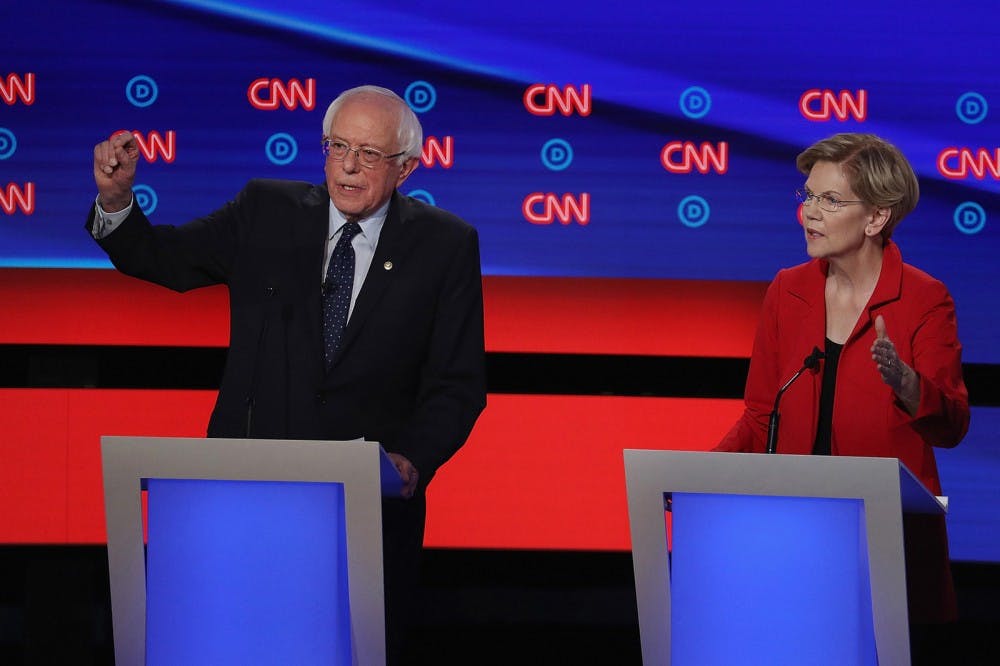Misyrlena Egkolfopoulou
Bloomberg News
WASHINGTON — Even in New Hampshire, where the nation's highest percentage of young people graduate from college owing money, Elizabeth Warren and Bernie Sanders might have a hard time persuading voters of their plan to cancel all such debts and make public university free.
To Sanders and Warren, New Hampshire is a must-win, given that they represent neighboring Vermont and Massachusetts in the U.S. Senate. But the student-debt issue is a microcosm of the challenge both candidates face selling their progressive vision in places where more moderate views prevail.
A recent YouGov/CBS poll showed that 61% of Democratic voters in New Hampshire want tuition lowered through added government subsidies, but not free. Only 32% of New Hampshire voters favored tuition-free colleges, while 7% said higher education should cost students whatever the market allows.
"When you put together free and college in the same sentence, that's where you might see some disagreement among voters in New Hampshire," said Dante Scala, a politics professor at the University of New Hampshire. "It's fool's gold to chase younger voters if at the same time you're turning off a greater number of older, more moderate voters."
The average student in New Hampshire, which holds its primary shortly after the first-in-the-nation Iowa caucuses in February, graduates with more than $34,000 in debt, the fourth- highest average in the nation. And 74% of students in the Granite State finish college with debt, the highest percentage in the nation, according to 2017 research by the Institute for College Access and Success.
So it seemed only natural that Sanders and Warren would highlight their plans when they both did a swing through the state last week.
"Anybody here dealing with student debt?" Sanders asked the crowd during a town hall in Wolfeboro. Almost a third of the people raised their hands.
Warren drew on her own personal experiences to highlight the necessity for free education.
"For me personally, I was able to get a four-year diploma without debt, because taxpayers had invested in a commuter college that would cost $50. That option is not there any more," Warren told reporters in Franconia.
Warren and Sanders are counting on progressive young New Hampshire voters who are expected to show up at the polls in large numbers. But the overall electorate skews older. Exit polls show young voters in New Hampshire only made up about 20% of the total electorate in 2016, while 60% was 45 and older.
"There's a generational fairness issue," said Mark Huelsman, associate director of policy and research at think tank Demos, which has advocated student-loan forgiveness.
"The generation that is maturing politically is both dealing with student debt and for the first time dealing with the idea that they might have to pay for their kids to go to college," Huelsman said, pointing out that the cost of higher education may still be an important issue for older voters who worry about financing the educations of their children or grandchildren.
"Getting rid of all debt for everyone, is not necessarily something I'm 100% a fan of because there is a lot of people out there who take out debt and do have the income to be able to afford it," said Matt Gerding, a graduate student at the University of New Hampshire, who's taken out $45,000 in loans for undergraduate and graduate school. "Warren's plan is focused on those who need the help the most, which I like."
Sanders's $2.2 trillion plan would cancel all student debt in America, while making public universities free for everyone, regardless of ability to pay. His proposal would be financed by a 0.5% tax on stock transactions, a 0.1% tax on bond trades and a .005% tax on derivatives transactions.
Warren's $1.2 trillion plan, funded by a 2% tax on the assets of Americans worth more than $50 million, also calls for free public universities. But a Warren administration would cap loan forgiveness at $50,000 and would primarily target people who make less than $100,000 a year.
The potentially good news for Sanders and Warren is that young voters have become increasingly active since President Trump was elected.




